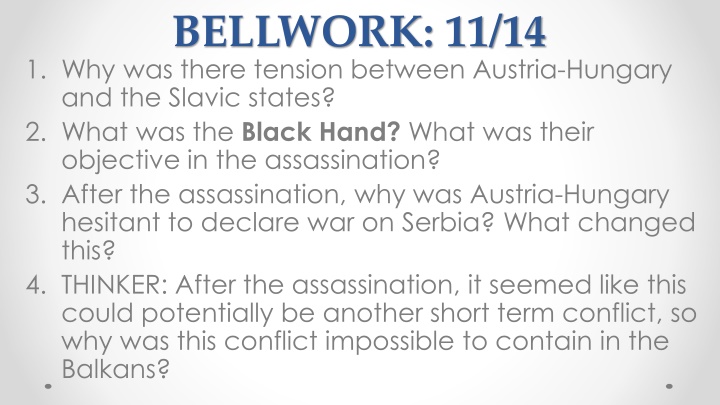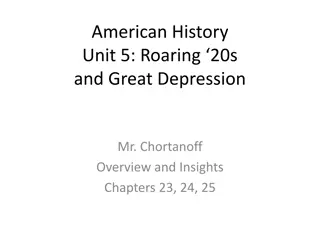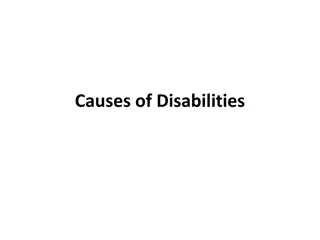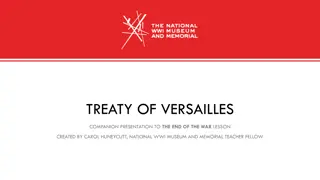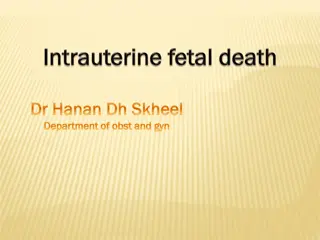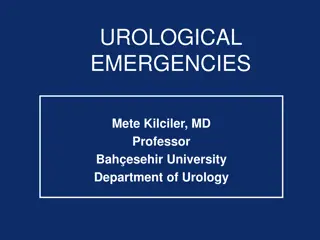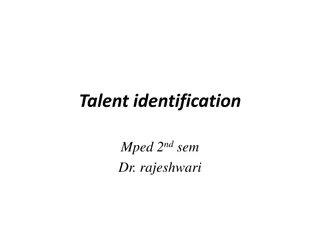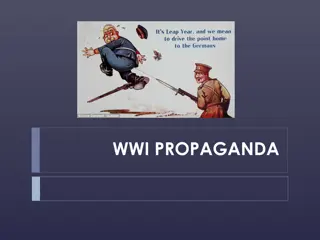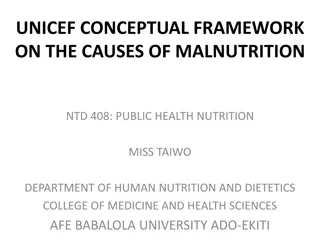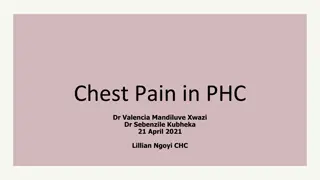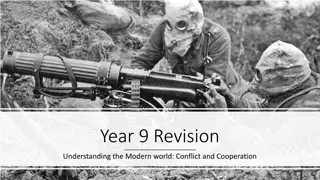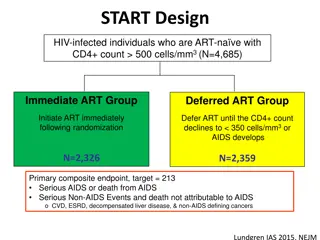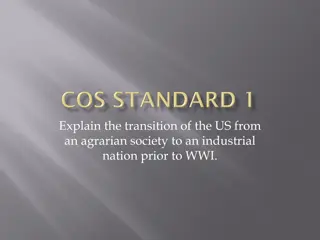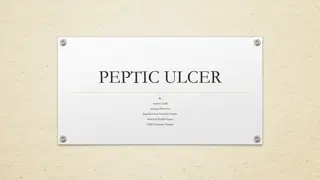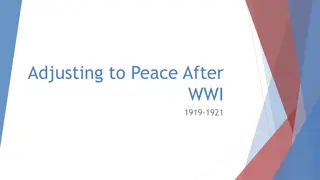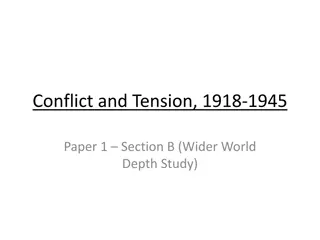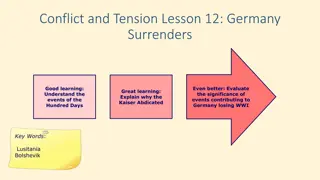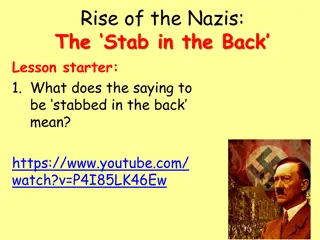The Assassination of Archduke Ferdinand and the Outbreak of WWI
Tension between Austria-Hungary and the Slavic states, the formation and objectives of the Black Hand society, the assassination of Archduke Franz Ferdinand, and the ensuing events that led to the outbreak of World War I in the Balkans.
Uploaded on Dec 06, 2024 | 3 Views
Download Presentation

Please find below an Image/Link to download the presentation.
The content on the website is provided AS IS for your information and personal use only. It may not be sold, licensed, or shared on other websites without obtaining consent from the author.If you encounter any issues during the download, it is possible that the publisher has removed the file from their server.
You are allowed to download the files provided on this website for personal or commercial use, subject to the condition that they are used lawfully. All files are the property of their respective owners.
The content on the website is provided AS IS for your information and personal use only. It may not be sold, licensed, or shared on other websites without obtaining consent from the author.
E N D
Presentation Transcript
BELLWORK: 11/14 1. Why was there tension between Austria-Hungary and the Slavic states? 2. What was the Black Hand? What was their objective in the assassination? 3. After the assassination, why was Austria-Hungary hesitant to declare war on Serbia? What changed this? 4. THINKER: After the assassination, it seemed like this could potentially be another short term conflict, so why was this conflict impossible to contain in the Balkans?
Immediate Cause of WWI The assassination of Ferdinand The assassination of Ferdinand and the outbreak of war and the outbreak of war
The Black Hand In May 1911, ten men in Serbia formed the Black Hand Secret Society. Early members included Colonel Dragutin Dimitrijevic, the chief of the Intelligence Department of the Serbian General Staff. The main objective of the Black Hand was the creation, by means of violence, of a Greater Serbia. Its stated aim was: "To realize the national ideal, the unification of all Serbs. This organization prefers terrorist action to cultural activities; it will therefore remain secret."
By 1914 there were around 2,500 members of the Black Hand. The group was mainly made up of junior army officers but also included lawyers, journalists and university professors. Three senior members of the Black Hand group, Dragutin Dimitrijevic, Milan Ciganovic, and Major Voja Tankosic, decided that Archduke Franz Ferdinand should be assassinated. The political objective of the assassination was to break off Austria-Hungary's south-Slav provinces so they could be combined into a Greater Serbia or a Yugoslavia. The Black Hand Members of the Black Hand
The People chosen for the task Gavrilo Princip, Nedjelko Cabrinovic and Trifko Grabez from Serbia made plans to assassinate him.
On 28 June 1914, the Archduke Franz-Ferdinand and his wife visited Sarajevo, the capital of Bosnia, to review the troops. It was also Serbia's National Day - the anniversary of the battle, in 1389, when Serbia was conquered by the Turkish Ottoman Empire, and when a Serb hero, Milos Obilic, assassinated the Ottoman Sultan. This day became linked with Serbian nationalism, and with the assassination of foreign rulers. Waiting for Franz Ferdinand, lined up along the Appel Quay, Sarajevo's main road, were six young men. They were armed with pistols and bombs supplied by the Black Hand. They were going to try to murder Franz Ferdinand! Assassination at Sarajevo
Assassination at Sarajevo Austrian spies in Serbia reported that there was going to be an assassination attempt. The PM of Serbia also told the Austrian government to expect trouble. Ferdinand ignored these warnings. Only 120 policeman were on duty in Sarajevo, and they were so excited that they forgot to watch the crowds, and looked at the procession instead. To reach the Town Hall the procession had to drive along the Appel Quay. The conspirators posted themselves along the route. At 10.10 am, as the procession drew near the Cumuria Bridge.
http://images.mentalfloss.com/sites/default/files/styles/insert_main_wide_image/public/2_map.jpghttp://images.mentalfloss.com/sites/default/files/styles/insert_main_wide_image/public/2_map.jpg
Near the Cumuria bridge: 1. Mehmed Mehmedbasic: told a friend that he could not get a clear opportunity and that a policeman had approached him just as he was about to throw the bomb. 2. Vaso Cubrilovic: told investigation that felt sorry for the Duchess; said that he was badly placed. 3. Nedeljko Cabrinovic: threw a bomb. Wearing a long black coat and a black hat, he asked a policeman to tell him which car the Archduke was in; seconds later he had knocked the cap off a hand grenade against a metal lamp-post and aimed it at the Archduke seated in the open car. Witnesses at the trial agreed that the bomb had bounced off the folded-back hood of the Archduke's car. It blew up the car behind, killing two officers and injuring about twenty people. Cabrinovic swallowed poison, but it failed to work. After stopping to see what had happened, Franz Ferdinand's car sped to the Town Hall. 4. Cvetko Popovic: told a friend that could not see which was Franz Ferdinand because he was short-sighted; told the trial the lost his nerve. In the chaos of it all, the royal car turned around and moved towards Franz Joseph Street.
http://images.mentalfloss.com/sites/default/files/styles/insert_main_wide_image/public/2_map.jpghttp://images.mentalfloss.com/sites/default/files/styles/insert_main_wide_image/public/2_map.jpg
One of the conspirators, Gavrilo Princip, was standing on the corner at the time. An advisor immediately realized the driver had taken the wrong route and shouted "What is this? This is the wrong way! We're supposed to take the Appel Quay!" The driver put his foot on the brake, and began to back up. In doing so he moved slowly past the waiting Gavrilo Princip. The assassin stepped forward, drew his gun, and at a distance of about five feet, fired several times into the car. Franz Ferdinand was hit in the neck and Sophie in the abdomen. Princip's bullet had pierced the archduke's jugular vein but before losing consciousness, he pleaded "Sophie dear! Sophie dear! Don't die! Stay alive for our children! They drove to the governor s residence but although both were still alive when they arrived, they died from their wounds soon afterwards.
File:Sarajevo princip bruecke.jpg Princip Bridge: sight of Archduke Ferdinand s assassination
Nedjelko Cabrinovic, statement in court (October, 1914) We did not hate Austria, but the Austrians had done nothing since the occupation, to solve the problems that faced the Slavs. Nine-tenths of our people are farmers who suffer, who live in misery, who have no schools, who are deprived of any culture. We sympathized with them in their distress. We thought that only people of noble character were capable of committing political assassinations. We heard it said that he (Archduke Franz Ferdinand) was an enemy of the Slavs. Nobody directly told us "kill him"; but in this environment, we arrived at the idea ourselves. I would like to add something else. Although Princip is playing the hero, and although we all wanted to appear as heroes, we still have profound regrets. In the first place, we did not know that the late Franz Ferdinand was a father. We were greatly touched by the words he addressed to his wife: "Sophie, stay alive for our children." We are anything you want, except criminals. In my name and in the name of my comrades, I ask the children of the late successor to the throne to forgive us. As for you, punish us according to your understanding. We are not criminals. We are honest people, animated by noble sentiments; we are idealists; we wanted to do good; we have loved our people; and we shall die for our ideals.
Name Gavrilo Princip Nedjelko abrinovi Trifun Grabe Vaso ubrilovi Cvjetko Popovi Lazar uki Sentence Life in prison 20 years 20 years 16 years 13 years 10 years Danilo Ili Death by hanging (executed 3 February 1915) Veljko ubrilovi Death by hanging (executed 3 February 1915) Death by hanging; commuted to 20 years in prison by Kaiser Franz-Joseph based on Finance Minister's recommendation Nedjo Kerovi Mihaijlo Jovanovi Death by hanging (executed 3 February 1915) Jakov Milovi Mitar Kerovi Ivo Kranjcevi Branko Zagorac Marko Perin Cvijan Stjepanovi Life in prison Life in prison 10 years 3 years 3 years 7 years
Review: Events leading to the outbreak of war
German War Plans Avoid two-front war! Schlieffen Plan! Go through Belgium to capture Paris (~41 days) It would take Russia ~6 weeks to mobilize, so after France, turn East! http://t0.gstatic.com/images?q=tbn:ANd9GcRbd2YN_9hhXE9n9JXs6CBba9pbXyOXpeX8g-4N8TQY8TPiFHv_:www.3dhistory.co.uk/fact-sheet/images/029-Schlieffen-Plan-02.jpg
French War Plans High speed mobilization of forces to capture Alsace-Lorraine before crossing the Rhine Invade South - away from majority of German army
Russian War Plans Mobilize ASAP - Invade Central Powers!!!!! North group would fight Germany South group would fight A-H
Austro-Hungarian War Plans http://www.greatdreams.com/war/easternfront-WW1.jpg Split troops into two: Russia Serbia
HOMEWORK What is historiography? Read pages 118-119 in the 5.1 packet and complete the Historiography of WWI section of the note packet.
What is historiography? History is not static! It is dynamic, debatable, and constantly changing. Two historians looking at the same event and facts will arrive at two different conclusions. The study of how history changes over time The study of different interpretations of history For example when studying U.S. imperialism: 1900 s: necessary to create sphere of influence = world power 2000 s: restrictive of individual rights = oppressive The study of historians methods What sources do they use? Why? Background? What biases are present? The history of history In IB, analyzing OPCVL is helpful in understanding historiography! https://www.youtube.com/watch?v=pB3xb1_gp4Y
Bellwork: 11/14 Who do you think is most to blame regarding the outbreak of WWI? Which historian do you agree with the most regarding how/why WWI began? Why? Explain! THINKER: Do you think countries should be required to take the blame for starting war? If so, should they be punished following the war? Why or why not? 1. 2. 3.
Time to play a game THE BLAME GAME!!!
FAY FISCHER HOBSBAWM FERGUSON STOESSINGER
Group Review What was the contribution of each of the European powers during the July Crisis to the outbreak of war? Divide into groups of 3 Be ready to discuss each countries contribution to the outbreak of WWI. May also consider the roles they played in the build-up to the crisis
Partner Discussion Do you think countries should be required to take the blame for starting war? If so, should they be punished following the war? Why or why not?
What is the message of this political cartoon with regards to the outbreak of WWI?
German War Plans Avoid two-front war! Go through Belgium to capture Paris (~41 days) It would take Russia ~6 weeks to mobilize, so after France, turn East! http://t0.gstatic.com/images?q=tbn:ANd9GcRbd2YN_9hhXE9n9JXs6CBba9pbXyOXpeX8g-4N8TQY8TPiFHv_:www.3dhistory.co.uk/fact-sheet/images/029-Schlieffen-Plan-02.jpg
French War Plans High speed mobilization of forces to capture Alsace-Lorraine before crossing the Rhine Invade South - away from majority of German army
Russian War Plans Mobilize ASAP - Invade Central Powers!!!!! North group would fight Germany South group would fight A-H
Austro-Hungarian War Plans http://www.greatdreams.com/war/easternfront-WW1.jpg Split troops into two: Russia Serbia
FAY FISCHER HOBSBAWM FERGUSON STOESSINGER
HOMEWORK: Due Monday Read 5.2 (pages 120-122) and complete: o The Combatants portion of the note packet o Questions 1 & 2 on page 122
2014: The Blame Game The class will be divided into five groups. Each group will be assigned a country involved in the outbreak of war. Your task: Work as a group to convince the class that your country was the MOST at fault! To prepare: read about your assigned country s contribution to war (29-31). Also, read historian arguments (32-34) . Start brainstorming tonight! Tomorrow: your group will create a brief speech on why their country is to blame and must reference one historian in your argument!
Who is to blame for starting WWI? You will be assigned a group, and each group will be responsible for blaming a different country for their involvement in WWI. In your group you must prepare a speech/presentation to present to an International Tribunal which will decide .. Who is to blame? Take into consideration: o Their involvement in short/long term causes, responsibility for the beginning of the war, their acts of aggression, lack of prevention of war, and historians arguments
